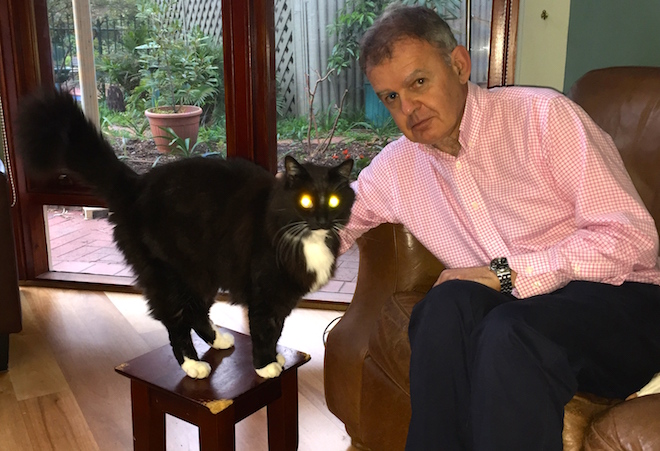David Lemmings
 On the Couch •
On the Couch •  Monday, September 12, 2016
Monday, September 12, 2016 On The Couch with Professor David Lemmings ... Exploring the life and times of the English bar in the eighteenth century ... He has also studied the early role of the press in reporting criminal trials and the part it played in forming public opinion about justice and the courts
 The eyes have it: Blackstone at home with Professor Lemmings
The eyes have it: Blackstone at home with Professor Lemmings
David Lemmings is Professor of History at the University of Adelaide and leader of the "Change" program in the Australian Research Council Centre for the History of Emotions.
His work has focussed on the history of the legal profession in late seventeenth and eighteenth century England and more broadly on law and society in England and its former colonies.
He has published extensively on the socio-cultural history of law and the legal professions in Britain of the 1700s.
His latest books are Law and Government in England during the Long Eighteenth Century: From Consent to Command (Palgrave Macmillan); (ed.) Crime, Courtrooms and the Public Sphere in Britain, 1700-1850 (Ashgate, 2012); (ed., with Ann Brooks) Emotions and Social Change: Historical and Sociological Perspectives (Routledge, 2014); and (ed. with Heather Kerr and Robert Phiddian) Passions, Sympathy and Print Culture: Public Opinion and Emotional Authenticity in Eighteenth-Century Britain (Palgrave-Macmillan, 2015).
He has also just edited Book One of Blackstone’s Commentaries on the Laws of England for Oxford University Press.
Justinian is also a huge fan of Lemmings' book Professors of the Law, which explored barristers and the English legal culture in the eighteenth century.
Prof. Lemmings is also speaking at a conference on Emotions in Legal Practices at the University of Sydney, September 26-28. With Dr Amy Milka, from the Uni of Adelaide, he is giving a paper on Mediated Emotions in the Eighteenth Century Criminal Courtroom.
We've got this great scholar of the intersection of law, history and emotions on the couch ...
Describe yourself in three words.
Je pense, donc je suis (Descartes), or in three words: cogito ergo sum.
What are you currently reading?
I read the 'London Review of Books' to keep in touch, but rarely follow-up with the titles themselves.
What's your favourite film?
I normally see films on planes, and can't remember the titles. 'The Duchess' was excellent.
Who has been the most influential person in your life?
The late Peter Pryce, my history teacher at school, who taught me more than history.
When were you happiest?
On my wedding day.
What is your favourite piece of music?
'Curtain Tune' by Matthew Locke (1622-77)
What can the lawyers of eighteenth-century England teach us about the lawyers of today?
Not much. Modern day lawyers have followed their eighteenth century forbears' lead by maximising their profits and representing the very wealthy. More positively, some eighteenth-century English lawyers campaigned for good causes, such as the amelioration of capital punishment and the freedom of the press.
What is in your refrigerator?
Lots of fruit and vegetables from the local farmers' market; but not enough champagne.
What makes you frightened?
Needing to defend my rights in court (given the prohibitive costs, I would have to represent myself).
Who would you most like to be with in a lift that has broken down?
Hilary Mantel (author of Wolf Hall), or Thomas Cromwell himself (the subject of Wolf Hall).
Why did you study history?
I have always been fascinated by the living conditions of people in the past, but I suspect I was attracted to British history by the triumphalist slant of much popular history when I was a child.
Tell us about the intersection of law, history and emotions.
It's a commonplace that the law is blind and rational. The best lawyers are experts in the art of emotional persuasion, however, and criminal courts are theatres of power. In eighteenth century England barristers began to appear in criminal trials, and the burgeoning newspaper press took a great interest in sensational criminal trials. I'm interested in how these developments changed popular impressions about justice in the courts.
What is the work of which you are most proud?
Professors of the Law (Oxford, 2000), although it took years of my life!
What are the lessons to be drawn from a study of "the emotions of the public sphere" in eighteenth century England?
The most obvious lesson is that with the rise of the newspaper press government had to take more notice of public opinion. For example, in mid-century the government employed the novelist and magistrate Henry Fielding to manage opinion and crime and policing in London.
What was the most important opportunity you didn't take?
I must have repressed it.
If you were on death row, what would you request for your last meal?
Pasta.
If you were a foodstuff, what would you be?
Mushrooms - like me, they are active at night.
Whom do you most admire professionally?
Julian Burnside QC, because he stands up for the weak and defenceless.
What is your favourite book?
My favourite books are children’s books: "Zog", by Julia Donaldson and "Zagazoo", by Quentin Blake.
What would you change about Australia?
The tribalism over sport - I find it very irritating.
What would your epitaph say?
Worked hard and was kind to children and pets.
What comes into your mind when you shut your eyes and think of the word "law"?
Men and women in wigs and gowns: I envy a profession that gets to dress-up and swank around regularly.
 Barristers,
Barristers,  Law and emotions,
Law and emotions,  Legal history
Legal history 









Reader Comments